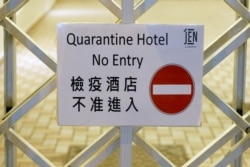The coronavirus pandemic has cast a spotlight on longstanding privileges enjoyed by mostly white and Western expatriates in the former British colony, breeding resentment among many of the territory's mainly Chinese majority.
The resentment peaked in August amid an outraged reaction after Australian actress Nicole Kidman was permitted to avoid stringent quarantine measures when she arrived in a private jet for the shooting of an Amazon TV show called "Expats."
But the anger had been brewing since the beginning of the pandemic early last year, when many Westerners appeared less willing than their Asian counterparts to don face masks and practice social distancing to slow the spread of COVID-19.
Policies enacted by the Beijing-backed local government have contributed to the sense that the rich and powerful — many of whom are white — are being granted special treatment.
In June, Hong Kong Chief Executive Carrie Lam offered quarantine exemptions to fully vaccinated senior financial executives in a bid to "revive Hong Kong's economy." Bloomberg reported that the city paused the plan within a few weeks of the announcement, and the government later confirmed that only two out of more than 150 applications were approved.
Michael Tien, a pro-establishment member of the Legislative Council, Hong Kong's legislature, questioned the treatment of Kidman who was exempted from strictly enforced rules requiring visitors to quarantine in an approved hotel for 21 days.
"Even our Olympians from Tokyo Olympics have to quarantine for seven days," he said in a Legislative Council meeting.
"Now that you have created a precedent, does that mean that all foreign movie stars will be exempted when they fly to Hong Kong to film movies?" he asked.
Officials justified the Kidman exemption on the grounds that she was in Hong Kong "for the purpose of performing designated professional work, taking into account that it is conducive to maintaining the necessary operation and development of Hong Kong's economy."
But the explanation did little to ease the anger of Veta Chan, a 27-year-old Hong Kong resident who shared her frustrations with VOA.
"She came to film a series for Amazon, not for local TV operations. How can they justify that?" she asked. She added that the Kidman episode merely heightened a resentment toward Westerners that had begun months earlier.
"Hong Kong people have had bad impressions of expats since the initial stage of the pandemic because they believed expats' refusal to wear face masks voluntarily at the time contributed to the clusters," she said.
In Asia, wearing face masks to prevent the spread of diseases has become a regular part of life since the SARS outbreak started in China in 2003 spread to Singapore, Taiwan, and Hong Kong.
In addition, police have treated locals and expats differently during the COVID-19 pandemic, according to a white European expat teacher who refused to provide his name out of fear of tainting his international school's reputation.
"White expats could afford to be rude and aggressive, and still get away with it, and local cops don't seem to enforce [COVID-19] rules on them," the 35-year-old said.
"Nicole Kidman shouldn't be exempted just because she's famous. The same rule should apply [to her]. The fact that she can get away [with this] is unfair. It is insensitive to local people, and so they can be fairly upset," he said.
The teacher also contrasted the treatment of Westerners with the territory's large contingent of low-paid domestic workers, most of whom come from the Philippines or Indonesia.
"Compared to Filipinos, I seem to be allowed more rights and get a ridiculous salary. … Our school ended up hiring a British white guy to fill a teacher's post even when he doesn't have a teaching qualification, while we have local teachers with qualifications. It's just due to his passport," the teacher said.
The school did not respond to VOA's request for comment and verification.
An expat worker with five to 10 years of relevant experience earns an average of $88,126 a year, the South China Morning Post reported last year, citing figures from consulting firm ECA International. The average yearly salary of a local manager with similar experience is about $64,740.
Among the foreign workers in Hong Kong, one-third are Filipinos, one-fourth are Indonesians, while one-tenth are white, government data showed. Almost half of all expats are domestic workers whose average annual salary is only $7,728, according to a survey from HelperChoice, a Hong Kong recruitment agency.
"I don't think it's fair," the expat teacher said, referring to the gap between the salary package of largely white expat workers and their local counterparts and Southeast Asian domestic workers.
The wealth gap is prevalent in Asia, attracting more white people to come to Asian countries for more privileges, according to Tong Yuying, professor of sociology at the Chinese University of Hong Kong specializing in social demography and migration.
"White people have more opportunities here [in Asia], so if they can take advantage of this trend, why not? European and American cultures are prevailing because they are from developed countries," Tong said.
"White people have cultural superiority, and Asian countries buy that. Asian countries don't need them to learn the local language, because companies want to attract 'international' workers, who are usually white."
Tong pointed to class and the former colonial rule in Hong Kong as contributing to the inequality.
"Hong Kong's racism is related to class. Privileged nationals come from developed nations, while domestic helpers come from developing nations and so people tend to think they are less powerful, lower-educated and lower-skilled. Workers from China and Southeast Asia are prone to being discriminated against."
"This started in the colonial era. People whose performance was average in their own countries were appointed more senior positions in Asia, and were able to amass wealth and gain more privilege. Now it's not the colonial era anymore, but the situation is still similar."
The silver lining lies in the fact that white people and privileged expats in Hong Kong have started reflecting on their own privilege.
"They started thinking about how to treat minorities and how they can better interact with other nationalities, but this will be a long process," Tong said.









